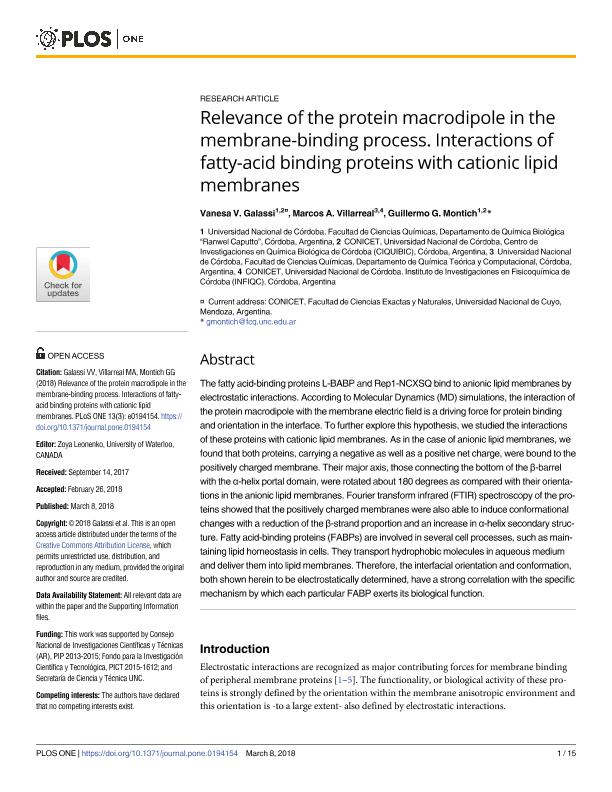Artículo
Relevance of the protein macrodipole in the membrane-binding process. Interactions of fatty-acid binding proteins with cationic lipid membranes
Fecha de publicación:
03/2018
Editorial:
Public Library of Science
Revista:
Plos One
e-ISSN:
1932-6203
Idioma:
Inglés
Tipo de recurso:
Artículo publicado
Clasificación temática:
Resumen
The fatty acid-binding proteins L-BABP and Rep1-NCXSQ bind to anionic lipid membranes by electrostatic interactions. According to Molecular Dynamics (MD) simulations, the interaction of the protein macrodipole with the membrane electric field is a driving force for protein binding and orientation in the interface. To further explore this hypothesis, we studied the interactions of these proteins with cationic lipid membranes. As in the case of anionic lipid membranes, we found that both proteins, carrying a negative as well as a positive net charge, were bound to the positively charged membrane. Their major axis, those connecting the bottom of the β-barrel with the α-helix portal domain, were rotated about 180 degrees as compared with their orientations in the anionic lipid membranes. Fourier transform infrared (FTIR) spectroscopy of the proteins showed that the positively charged membranes were also able to induce conformational changes with a reduction of the β-strand proportion and an increase in α-helix secondary structure. Fatty acid-binding proteins (FABPs) are involved in several cell processes, such as maintaining lipid homeostasis in cells. They transport hydrophobic molecules in aqueous medium and deliver them into lipid membranes. Therefore, the interfacial orientation and conformation, both shown herein to be electrostatically determined, have a strong correlation with the specific mechanism by which each particular FABP exerts its biological function.
Palabras clave:
Electrostatics
,
Protein binding
,
Macrodipole
,
Cationic Membranes
Archivos asociados
Licencia
Identificadores
Colecciones
Articulos(CCT - MENDOZA)
Articulos de CTRO.CIENTIFICO TECNOL.CONICET - MENDOZA
Articulos de CTRO.CIENTIFICO TECNOL.CONICET - MENDOZA
Articulos(CIQUIBIC)
Articulos de CENTRO DE INVEST.EN QCA.BIOL.DE CORDOBA (P)
Articulos de CENTRO DE INVEST.EN QCA.BIOL.DE CORDOBA (P)
Articulos(INFIQC)
Articulos de INST.DE INVESTIGACIONES EN FISICO- QUIMICA DE CORDOBA
Articulos de INST.DE INVESTIGACIONES EN FISICO- QUIMICA DE CORDOBA
Citación
Galassi, Vanesa Viviana; Villarreal, Marcos Ariel; Montich, Guillermo Gabriel; Relevance of the protein macrodipole in the membrane-binding process. Interactions of fatty-acid binding proteins with cationic lipid membranes; Public Library of Science; Plos One; 13; 3; 3-2018; 1-15; e0194154
Compartir
Altmétricas




